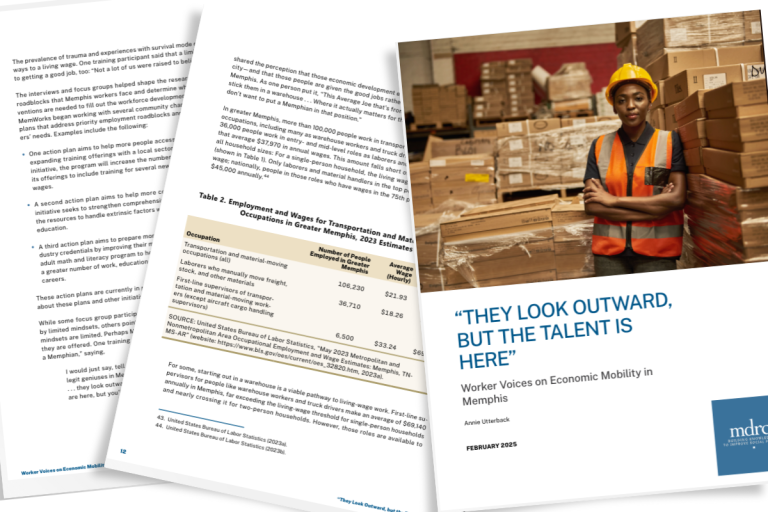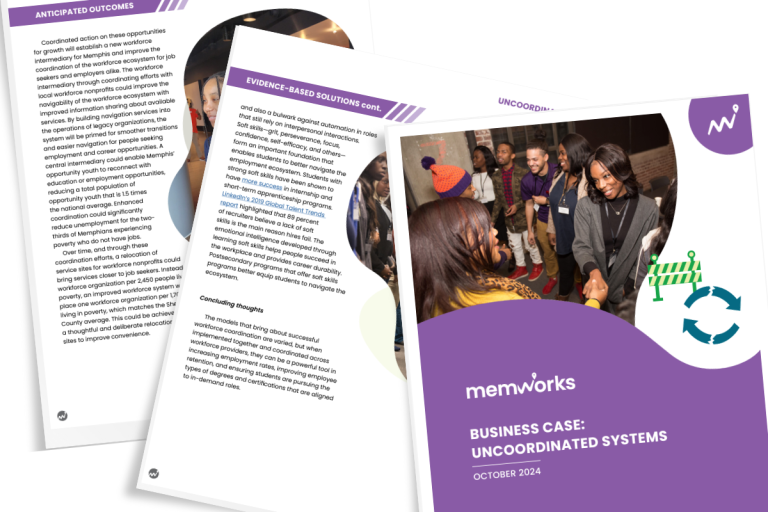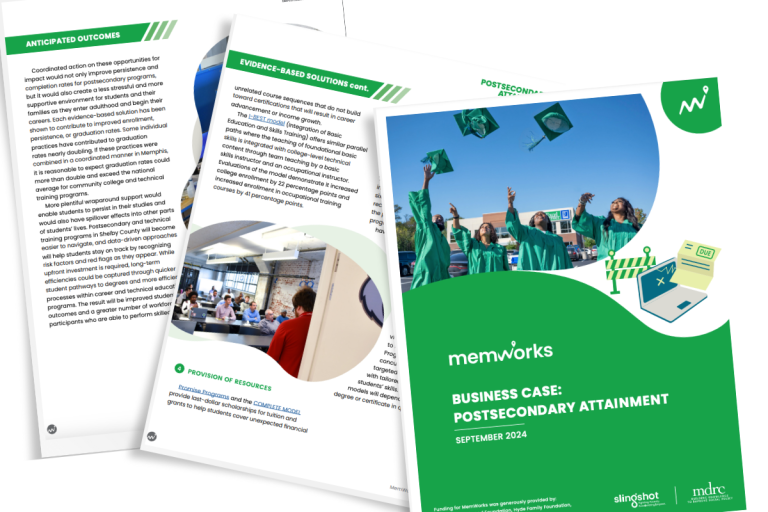MemWorks built a comprehensive understanding of the challenges faced by workforce participants living in poverty before developing evidence-based solutions to address them. Meeting with workforce participants, and the organizations that support them, to understand their experience pursuing postsecondary education and seeking living-wage career paths was a core focus of MemWorks. We conducted surveys, interviews, and focus groups with more than 100 postsecondary students, workforce participants, employers, and nonprofit staff who provide workforce services.
This blog post highlights the impact self-efficacy, or rather the lack of self-efficacy, has on inhibiting Memphians experiencing poverty from reaching living-wage jobs. Self-efficacy is the capacity of people to achieve their long-term goals through resilience and belief in their ability to succeed. Various workforce development organizations have opportunities to help aspiring workforce participants build greater self-efficacy.
Building self-efficacy while developing technical skills
“I have a family, you know, I want to take care of them. And I’m able to do that now because I went through the class,
I did the work, I’m doing the work. I’m putting my skills to use and it’s all because they take a chance on me.
You know, they saw something in me I didn’t see in myself, and they worked with me.”
– Advance Memphis Alum
Both participants and staff members of workforce training programs stress the importance of building resiliency and coping skills. Some postsecondary staff members observed a lack of confidence in students, which they attribute to a lack of positive role models and caring adults in their lives. They noted that students can get discouraged quickly and hold back in fear of making mistakes. Staff shared an example of several students giving up on completing technical training program applications if they experienced a small computer glitch during the application, citing a lack of resiliency to troubleshoot the problem or complete a new application.
At one training organization, participants shared that the programming helped foster confidence, perseverance, and the practice of setting higher expectations. One participant shared that the program helped set a higher goal for how much money she felt she deserved to make as she pursued a new job. This helped her find a job that met her wage expectations.
Employers can invest in employees to build resiliency
“[Memphis has] a lot of jobs that tell you, ‘Hey, just pack this box or just seal this or just do that and you’ll be good for eight hours.’ And it’s not challenging us, it’s not growing our mindsets, it’s not giving us tools that we could actually use in the real world outside of just that job. And they don’t even pay enough for that. You know? I’ve worked at different places here in Memphis and all of them are temporary to me because not a lot of people care about their workers. Not a lot of people care about how we get to and from those jobs and what conditions we are in at those jobs, just their production.”
– MICR Alum
When workers are stuck in entry-level jobs – jobs that have low pay, rote tasks, and a lack of upward mobility – that environment can lead them to feel like they’re not worth more and set low expectations for themselves. Several Memphians discussed regaining the confidence – through programs, education, or community – to feel like they deserve better.
We heard from employees that they crave employers that invest in their growth and development. They look for their employers to value them authentically as people, not just task completers, and care about their goals and the challenges they face. Knowing that their manager cares about them helps employees build confidence and generate stronger self-efficacy. A benefit for employers is that employees who feel valued tend to stay in their jobs longer, reducing turnover and the costs associated with hiring and training new staff.
Self-efficacy can help overcome survival mode
“[My] business is a little slow right now…That’s okay, too. You gonna have your bad days. And I learned everything ain’t always gonna be good. [The program] taught me how to be resilient.”
– Technical Training Alum
Challenges always arise in the pursuit of long-term goals. People are best prepared to tackle these challenges when they possess a foundation of self-efficacy. Technical training programs and employers can provide opportunities to practice resilience and coping skills. Repetition fosters self-efficacy, breaking the cycle of survival mode.
When training programs and employers build the confidence of their students/employees, long-term career plans become possible and realistic.





